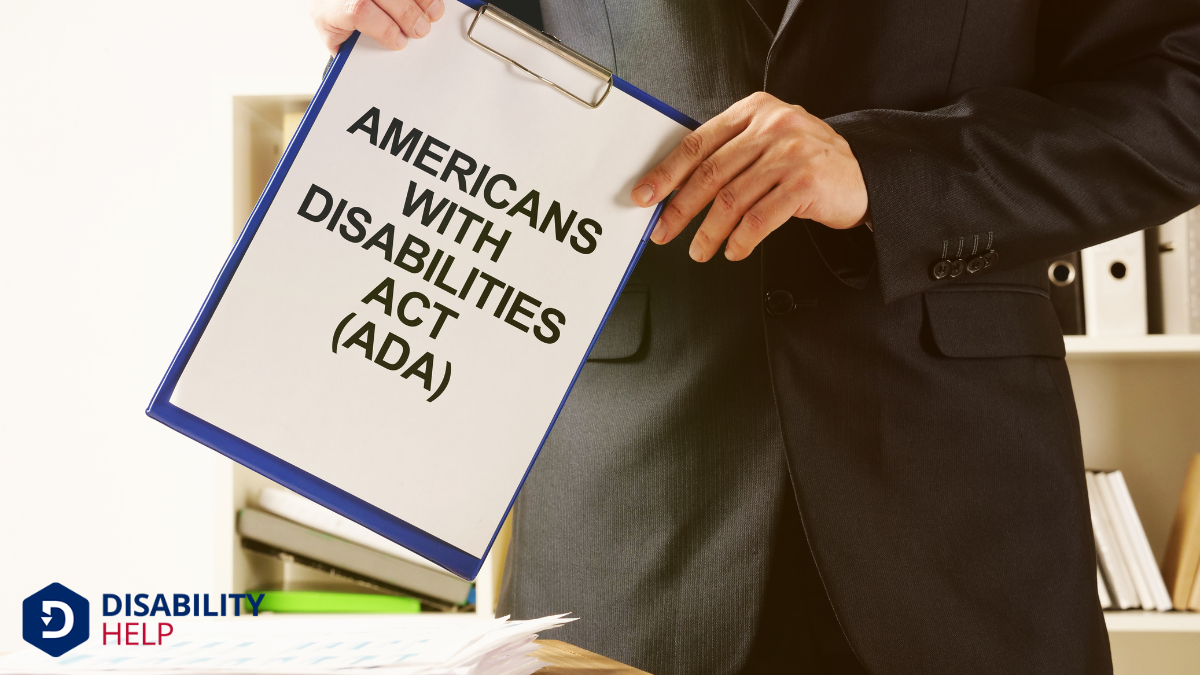When we encounter disability discriminationUnfair treatment of individuals based on their disability in areas such as employment, education, an... at work, it can be a challenging experience that leaves us feeling isolated and unsure of our next steps. It's essential to recognize the signs and understand our rights under the ADA. By documenting each incident and seeking support from trusted colleagues, we can build a strong case. Let's explore how to address this issue effectively, ensuring our workplace becomes inclusive and respectful for everyone.
Key Takeaways
- Document instances of discrimination with specific details, dates, and evidence for future reference.
- Report the discrimination following company protocols to allow for employer intervention.
- Request reasonable accommodationsModifications or adjustments in healthcare settings to support patients with disabilities. from your employer to ensure a fair working environment.
- Consult an employment law attorney to explore legal options and assess the strength of your case.
- File a complaint with the EEOC within the appropriate timeframe to address the issue formally.
Recognizing Disability Discrimination
How can we spot disability discrimination in the workplace?
Let's start by observing any unequal treatment towards colleagues with disabilities. If someone with a disability is denied opportunities or faces harsher criticism compared to others without disabilities, that's a red flag.
We should also be mindful of workplace policies that may indirectly disadvantage individuals with disabilities, like inflexible schedules or inaccessible facilities.
Another sign is the presence of derogatory comments or jokes about disabilities, which creates a hostile environment.
It's important to recognize when accommodations aren't provided or are insufficient for those who need them.
By staying aware and attentive, we can better identify discrimination and support our coworkers.
Together, we can create a more inclusive and fair workplace for everyone.
Understanding Your Rights Under the ADA

As employees, it's essential that we recognize our rights under the Americans with Disabilities Act (ADA)A U.S. law that prohibits discrimination against individuals with disabilities in all areas of publi... because it empowers us to advocate for ourselves and others in the workplace.
The ADA guarantees that individuals with disabilities aren't subjected to discrimination and have equal opportunities.
We've the right to reasonable accommodations, which are adjustments or modifications enabling us to perform our job duties effectively.
If we need an adjustment, we should communicate our needs to our employer, who's legally obligated to engage in an interactive process to find a suitable solution.
Understanding these rights helps us stand firm against any form of discrimination and fosters an inclusive work environment.
Let's remember, knowing our rights is the first step toward workplace equality.
Documenting Instances of Discrimination
When we experience disability discrimination at work, it's essential to document each instance thoroughly.
We should record specific incidents, gather witness statements, and save any relevant communication like emails or messages.
This documentation can help us build a strong case if we need to report the discrimination formally.
Record Specific Incidents
Keeping a detailed record of specific incidents is essential for anyone facing disability discrimination at work. We should document each occurrence meticulously, noting the date, time, and location.
It's important to describe what happened and who was involved, including any direct quotes or actions that contributed to the discriminatory behavior. By doing this, we're creating a clear timeline that can help us recall details accurately if the need arises.
It's also beneficial to capture our feelings and the impact these incidents have on us. These records not only serve as evidence but also validate our experiences, helping us recognize patterns over time.
Let's guarantee that our notes are factual and free from emotional language to maintain credibility. This documentation empowers us as we seek resolution.
Gather Witness Statements
A vital step in addressing disability discrimination at work is to gather witness statements. When others observe the incidents we experience, their accounts can provide essential support to our claims.
We should reach out to colleagues who witnessed discriminatory behavior and ask if they’d be willing to share what they saw. It’s important to explain why their statements matter and reassure them about confidentiality.
Gathering these accounts can paint a clearer picture of the environment and validate our experiences. Let’s aim to collect detailed descriptions, including dates, times, and any direct quotes.
These statements will help us build a strong case, underscoring patterns of behavior that might otherwise go unnoticed. Together, we can guarantee our voices are heard and understood.
Save Relevant Communication
To effectively document instances of discrimination, we must save all relevant communication related to these incidents. Emails, text messages, and any written exchanges that highlight discriminatory behavior should be preserved carefully.
When possible, take screenshots or print copies to guarantee we've a solid record. This documentation acts as concrete evidence, strengthening our case if we decide to report the discrimination to HR or pursue legal action.
We should create a dedicated folder, either physical or digital, to organize these communications systematically. Label them with dates and brief descriptions for easy access.
Seeking Support From Colleagues and Allies
When we face disability discrimination at work, building trusting relationships with colleagues can make a significant difference.
Let's focus on identifying workplace allies who understand our struggles and can offer support.
Building Trusting Relationships
Although maneuvering the workplace can be challenging, building trusting relationships with colleagues and allies is essential in combating disability discrimination. By fostering open communication, we create an environment where we feel safe sharing experiences and concerns.
Let’s start by being genuine and approachable, which encourages others to reciprocate. Offering support when we notice someone else facing challenges can also build rapport.
It’s important to listen actively, showing empathyThe ability to understand and share the feelings of another, particularly important in understanding... and understanding. When we form connections with those who respect and advocate for us, we strengthen our support network. This foundation of trust helps us navigate difficult situations together.
Identifying Workplace Allies
One effective way to combat disability discrimination at work is by identifying and seeking support from workplace allies.
We can find strength in numbers and create a more inclusive environment by connecting with those who understand and empathize with our situation. Allies can serve as sounding boards, offer advice, and even advocate on our behalf.
To identify potential allies, consider the following:
- Observe colleagues: Look for those who consistently show empathy and inclusivity in their interactions.
- Engage in conversations: Share experiences and listen to others, fostering mutual understanding and trust.
- Join employee resource groups: Participate in groups focused on diversityThe inclusion of individuals from a wide range of backgrounds, including people with disabilities. and inclusionThe practice of creating environments in which any individual or group can be and feel welcomed, res... to connect with like-minded individuals.
Encouraging Open Dialogues
How can we create a workplace where open dialogues flourish? It begins with us fostering an environment of trust and empathy.
We need to actively listen and engage with our colleagues, showing genuine interest in their perspectives and experiences. By doing so, we demonstrate that everyone’s voice matters.
Let’s initiate conversations about disability and inclusivity, encouraging colleagues to share their own stories and insights.
We can also support each other in discussions, making sure to amplify voices that might otherwise be overlooked.
It’s important to address any misunderstandings or biases with openness and compassion.
Reporting Discrimination to Your Employer

When facing disability discrimination at work, it’s crucial to report the issue to your employer promptly to initiate the resolution process.
By doing so, we create a formal record of the incident and give our employer a chance to address the situation.
Here's how we can effectively report discrimination:
- Document Everything: Write down dates, times, and details of discriminatory acts. Keep records of any relevant emails or messages.
- Follow Company Protocols: Check your employee handbook for the appropriate steps to report discrimination, whether to HR or a designated officer.
- Communicate Clearly: When reporting, be clear and concise about what happened, using the documented evidence to support your case.
Taking these steps helps us guarantee our concerns are addressed seriously.
Filing a Complaint With the EEOC
After reporting disability discrimination to our employer, we might find that the response isn’t adequate or timely. In such cases, filing a complaint with the Equal Employment Opportunity Commission (EEOC) could be our next step.
The EEOC is a federal agencyThe capacity of individuals with disabilities to act independently and make their own choices. that enforces laws against workplace discriminationUnfair treatment of employees based on disability, including hiring, promotion, job assignment, term.... To start, we should gather all relevant details and documents about the incidents. This includes dates, locations, and any communications we've had with our employer.
We can submit our complaint through the EEOC’s online portal, by mail, or in person at a local office. It's important to file within 180 days of the discrimination, although this can extend to 300 days if state laws also cover the incident.
The EEOC will then assess our case and determine the next steps.
Exploring Legal Options
While dealing with disability discrimination, if filing a complaint with the EEOC doesn't resolve the issue, we might need to explore legal options.
It's essential to understand what's available and how we can proceed. Consulting with an attorney who specializes in employment law can clarify potential remedies and strengthen our case.
We should consider:
- Assessing the strength of our case: An attorney can help evaluate the evidence and the likelihood of success.
- Understanding the legal process: Knowing the steps involved in a lawsuit will prepare us for what lies ahead.
- Exploring potential outcomes: We learn what compensation or remedies we might expect.
Exploring legal options can feel overwhelming, but with informed decisions, we gain control over our situation and pursue justice effectively.
Considering Mediation or Alternative Dispute Resolution

Although pursuing legal action is one way to address disability discrimination, we might also consider mediation or alternative dispute resolution (ADR) as viable paths.
Mediation allows us to engage in a structured dialogue with our employer, facilitated by a neutral third party. It encourages communication and can lead to a mutually beneficial resolution without the adversarial nature of a courtroom.
ADR offers flexibility, often proving quicker and less costly than legal proceedings. It lets us maintain control over the outcome rather than leaving it to a judge.
Focusing on Self-Care and Mental Health
Managing the challenges of disability discrimination can take a significant toll on our mental health, so it's crucial to prioritize self-care.
We need to carve out time and space to nurture our well-being. Let's focus on activities that help alleviate stress and build resilienceThe ability of individuals with disabilities to cope with and adapt to challenges and adversity..
Here are some self-care strategies we can consider:
- Mindful Practices: Engage in meditation or deep-breathing exercises to help calm our minds and reduce anxiety.
- Physical Activity: Incorporate regular exercise, like walking or yoga, to boost our mood and energy levels.
- Support Networks: Connect with friends, family, or support groups who understand our struggles and can offer encouragement.
Frequently Asked Questions
How Can I Educate My Coworkers About Disability Awareness?
Let's host workshops and share resources to educate our coworkers about disability awareness. We can invite speakers, distribute informative materials, and encourage open discussions. Together, we'll foster a more inclusive and understanding workplace environment for everyone.
Are There Resources for Finding Disability-Friendly Employers?
Sure, there are resources for finding disability-friendly employers. Let’s explore platforms like Disability:IN and the Job AccommodationAdjustments or modifications provided to individuals with disabilities to ensure equal access and pa... Network. They connect us with companies committed to inclusive practices, ensuring we find supportive and accommodating work environments.
What Are Some Examples of Reasonable Accommodations?
We can request reasonable accommodations like flexible work hours, modified equipment, or remote work options. It's important we communicate our needs clearly and collaborate with our employer to guarantee a supportive and inclusive work environment for everyone.
How Can I Support Disabled Colleagues Facing Discrimination?
We can support disabled colleagues by listening, advocating for fair treatment, and raising awareness about their rights. Let’s encourage open conversations, report discrimination to HR, and promote an inclusive work environment where everyone feels respected and valued.
Can Disability Discrimination Affect My Career Advancement?
Disability discrimination can impact career advancement by limiting opportunities and creating unfair barriers. Let’s actively address these issues by promoting equality, advocating for inclusive policies, and supporting one another to guarantee everyone has a fair chance to succeed.
Conclusion
Let's remember, we're not alone in facing disability discrimination at work. By recognizing it and understanding our rights under the ADA, we can take empowered steps forward. Document everything, seek support from colleagues, and report the issues through proper channels. If needed, consider legal options and mediation. Most importantly, let's prioritize our self-care and mental health. Together, we can foster a more inclusive workplace where everyone feels valued and respected.






